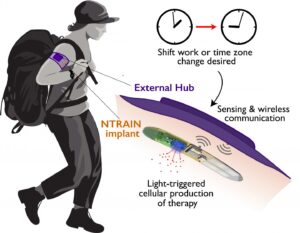 A group of University of Utah electrical and computer engineering researchers are part of a national team developing a wireless, fully implantable device that will control the body’s circadian clock, halving the time it takes to recover from disrupted sleep/wake cycles.
A group of University of Utah electrical and computer engineering researchers are part of a national team developing a wireless, fully implantable device that will control the body’s circadian clock, halving the time it takes to recover from disrupted sleep/wake cycles.
Nicknamed the “living pharmacy,” the device could be a powerful tool for military personnel, who frequently travel across multiple time zones, and shift workers including first responders who vacillate between overnight and daytime shifts.
Called NTRAIN (Normalizing Timing of Rhythms Across Internal Networks of Circadian Clocks), the project is part of the Advanced Acclimation and Protection Tool for Environmental Readiness (ADAPTER) program, the Defense Advanced Research Projects Agency’s (DARPA) new program to help address the challenges of travel, including jetlag, fatigue, and gastrointestinal issues.
The team, led by Northwestern University, will first focus on developing the implant and then validate the device in a second phase. If those milestones are met, researchers will test the device in human trials as part of the third phase. The full funding corresponds to $33 million over 41/2 years.
 U electrical and computer engineering professor Florian Solzbacher (pictured) and his lab will develop and provide thin film encapsulation for the device to increase its life and to minimize the effects of the body’s response to it.
U electrical and computer engineering professor Florian Solzbacher (pictured) and his lab will develop and provide thin film encapsulation for the device to increase its life and to minimize the effects of the body’s response to it.
The U researchers will be carrying out benchtop/in vitro testing of the encapsulation films and devices in ageing tests to identify how and when the device could fail, predict how long it could last in the human body, and provide evidence that the device should last sufficiently long enough in the body.
“We are leveraging more than 17 years of experience in developing and testing encapsulation for implantable devices and in analyzing and modeling failure modes for implants,” Solzbacher said.
Meanwhile, Salt Lake City-based neuroscience company, Blackrock Microsystems, which Solzbacher co-founded, has been tasked with system integration and building the devices for human testing.
Beyond controlling circadian rhythms, the researchers believe this technology could be modified to release other types of therapies with precise timing and dosing for potentially treating pain and disease. The DARPA program also will help researchers better understand sleep/wake cycles in general.
In addition to Northwestern University and the University of Utah, the research team also includes members from Carnegie Mellon University, the University of Minnesota, and Rice University.
“The experiments carried out in these studies will enable new insights into how internal circadian organization is maintained,” said Northwestern University neurobiology professor Fred W. Turek. “These insights will lead to new therapeutic approaches for sleep disorders as well as many other physiological and mental disorders, including those associated with aging where there is often a spontaneous breakdown in temporal organization.”